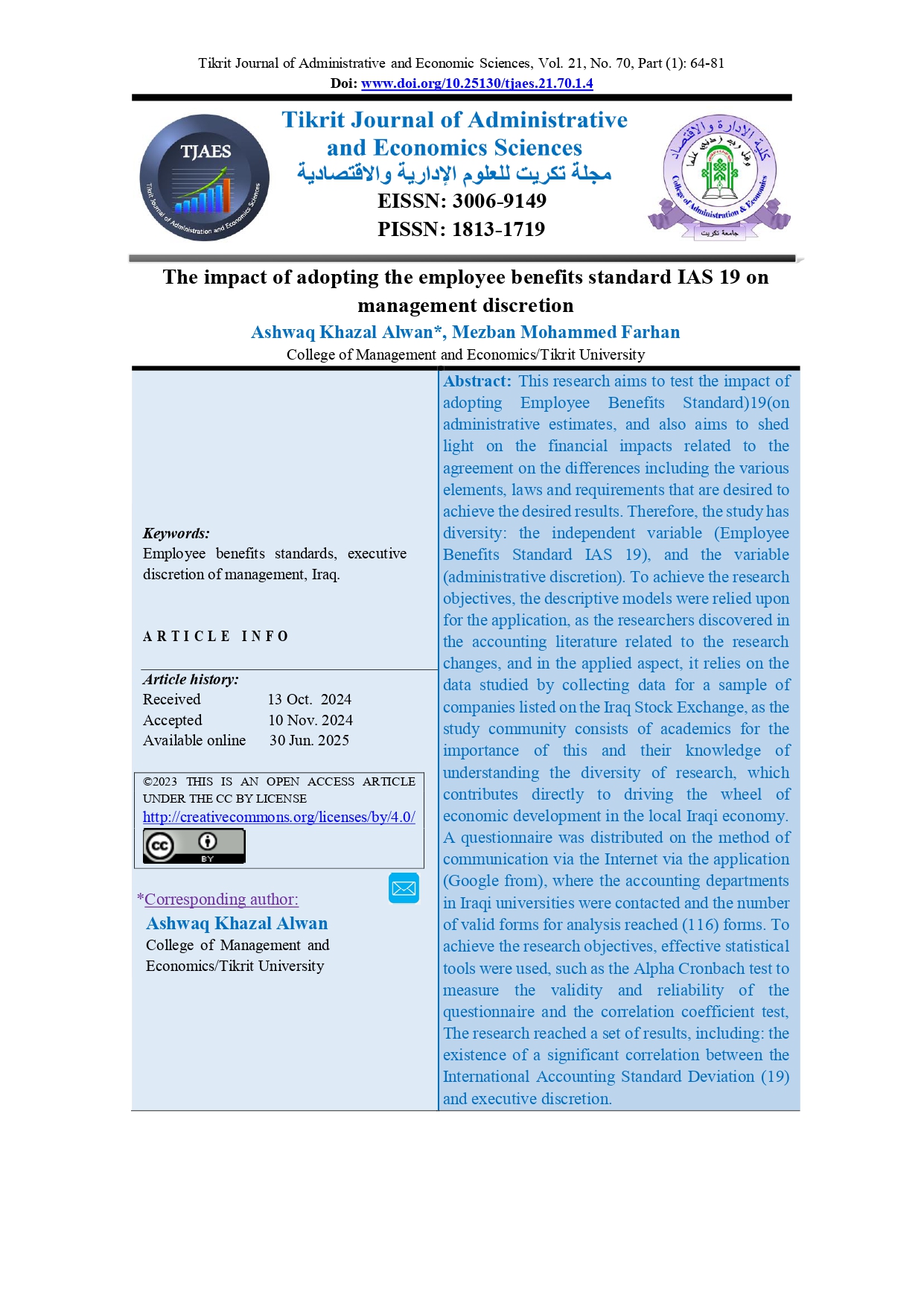The impact of adopting the employee benefits standard IAS 19 on management discretion
Main Article Content
Abstract
This research aims to test the impact of adopting Employee Benefits Standard)19(on administrative estimates, and also aims to shed light on the financial impacts related to the agreement on the differences including the various elements, laws and requirements that are desired to achieve the desired results. Therefore, the study has diversity: the independent variable (Employee Benefits Standard IAS 19), and the variable (administrative discretion). To achieve the research objectives, the descriptive models were relied upon for the application, as the researchers discovered in the accounting literature related to the research changes, and in the applied aspect, it relies on the data studied by collecting data for a sample of companies listed on the Iraq Stock Exchange, as the study community consists of academics for the importance of this and their knowledge of understanding the diversity of research, which contributes directly to driving the wheel of economic development in the local Iraqi economy. A questionnaire was distributed on the method of communication via the Internet via the application (Google from), where the accounting departments in Iraqi universities were contacted and the number of valid forms for analysis reached (116) forms. To achieve the research objectives, effective statistical tools were used, such as the Alpha Cronbach test to measure the validity and reliability of the questionnaire and the correlation coefficient test, The research reached a set of results, including: the existence of a significant correlation between the International Accounting Standard Deviation (19) and executive discretion.
Downloads
Article Details
References
اولاً. المصادر العربية:
الطماوي. سليمان، البنا. محمود، 2006، النظرية العامة للقرارات الإدارية، الطبعة 7، دار الفكر العربي، القاهرة.
بو ضياف. عمار، 2011، الوسيطة في قضاء الالغاء دراسة مقارنة مدعمة بتطبيقات قضائية، دار الثقافة للنشر والتوزيع، مصر.
مهدي. غازي، عبيد. عدنان، 2013، القضاء الإداري، الطبعة 2، بغداد.
كاظم. هناء، عبود. صعب، 2016، السلطة التقديرية للإدارة واساس المشروعية، مجلة الدراسات القانونية، العدد 15.
التميمي، صفاء. (2019)." تطوير الموارد البشرية في ظل المعيار المحاسبي رقم 19 منافع الموظفين دراسة تحليلية في عينة من شركات الاستثمار العراقية". مجلة تكريت للعلوم الإدارية والاقتصادية، المجلد 15، العدد 45، ص:197-211.
كريم. منتصر، أثر سلطة الإدارة التقديرية في ركن الاختصاص للقرار الإداري، مجلة العلوم القانونية والسياسية، المجلد الثامن، العدد 1.
معيار المحاسبة الدولية 19، منافع الموظفين، ترجمة الهيئة السعودية للمحاسبين القانونيين. 2020.
زين الدين محمد علي الجرادات. (2021). تأثير تطبيق معيار المحاسبة الدولي رقم (IAS19) منافع الموظفين على تقييم اداء الشركات الخدماتية والصناعية المدرجة في بورصة فلسطين ((Doctoral dissertation, جامعة القدس.
البوريني. عمر عبدالرحمن، 2021، المشروعية الإدارية كمحدد لممارسة الإدارة سلطاتها التقديرية دراسة مقارنة، مجلة كلية القانون الكويتية العالمية، السنة 10، ملحق خاص، العدد 10
فقير، سامية، وشيخي، بلال، (2021)، "مزايا المستخدمين وفق معيار المحاسبي الدولي رقم 19 والنظام المحاسبي المالي". مجلة رماح للبحوث والدراسات، المجلد 1، العدد 39، ص ص: 1-12
النصراوي. محمد، (٢٠٢٢)، التعارض بين السلطة التقديرية للإدارة في فرض ضريبة الدخل واساس قانونية وعدالة الضريبة، مجلة الشرائع للدراسات القانونية، المجلد 2، العدد 2.
طالبي. زهراء، 2022، السلطة التقديرية للإدارة، رسالة ماجستير، جامعة احمد دراية ادرار، الجزائر
ثانيا: المصادر الأجنبية:
Bloom. Robert, 2013, A Note on the New International Accounting Standards Board (IASB) Pronouncement IAS No 19, Compensation & Benefits Review 45(1) 54–57.
Billings, M., O’Brien, C., Woods, M., & Vencappa, D. (2017). Discretion in accounting for pensions under IAS 19: using the ‘magic telescope’? Accounting and Business Research, 47(2), 123-143.
Hamdan,M Khaled,N and Khaled,S.(2018)." Employee Benefits Accounting, Its Impact on the Market Share Price the Volume of Credit Facilities and Deposits". International Journal of Economics and Finance; Vol. 10, No. 1,PP23-31
Oyewo, B., Emebinah, E., & Savage, R. (2020). Challenges in auditing fair value measurement and accounting estimates: Some evidence from the field. Journal of Financial Reporting and Accounting, 18(1), 51-75


